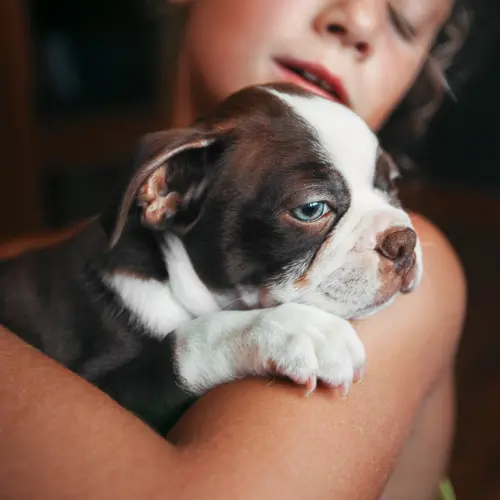Flatulence occurs when gas builds up in your dog’s intestinal tract and colon. This is commonly caused by the dog eating something new – either a change in diet or a food that they weren’t meant to eat. If your dog is eating food they can’t digest like dairy, soybeans, peas, or foods high in fat, they can experience chronic flatulence. Dog farts are typically not concerning, but if your dog’s gas becomes unbearable it may be time to make a change.
What Are Some Causes of Flatulence in Dogs?
Hard-to-digest foods like table scraps or spicy foods can give your dog an upset stomach, which can result in excessive gas or excessively smelly gas. Feeding them food or snacks with low-quality ingredients, fillers, or artificial preservatives can also give your dog gas.
If your dog is fed a high-quality diet and still has excessive gas, your veterinarian can test to see if they have poor digestion. They can also try to identify an intolerance or allergy your dog may have by eliminating ingredients from their diet and reintroducing them again.
Dogs who eat quickly will swallow more air while eating, which also leads to more flatulence.
Which Dogs Are Most at Risk?
If your dog is overweight, obese, or sedentary they are at a higher risk for chronic flatulence, regardless of diet.
Short-nosed breeds like Pugs, Boston Terriers, Shih Tzus, and Lhasa Apsos tend to swallow a lot of air when they eat or drink, which causes excessive farting.
Could Flatulence Be a Symptom of Another Health Issue?
Once you’ve ruled out a food intolerance or digestive issue as the cause of your dog’s flatulence, you may need to visit your vet to identify a more serious cause. Persistent dog farts may be a side effect of the following health issues:
- Inflammation of the large intestine or colon (canine colitis)
- Irritable bowel syndrome (IBS)
- Stomach infection
- Intestinal parasites such as worms
- Inflammatory bowel disease
- Inflammation of the pancreas
- Cancer
What Can I Do to Reduce My Dog’s Flatulence?
A healthy and consistent diet is the best way to reduce your dog’s farts. You can also try the following:
- Don’t give your dog table scraps. Dogs can’t easily digest scraps, including foods high in fats and sugars, which can cause bloating and discomfort.
- Don’t give your dog dairy products. Most dogs are lactose intolerant, which means that milk, cream, or cheese can upset their stomachs.
- Keep your dog out of the trash in your home and outside. Practice the command “leave it” when taking your curious dog on walks.
- Avoid giving your dog fart-inducing foods. Steamed vegetables like broccoli, cauliflower, and Brussels sprouts can be healthy for your dog, but also produce more gas.
- Slow down your speed-eater. Divide your dog’s food into smaller portions throughout the day or try a slow-feeding dish to make them slow down.
- Keep your dog active. Make sure they get plenty of exercise and playtime.
- Change your dog’s diet. If you switch your dog to a new food, gradually introduce the food with their current kibble over the course of a week or two.
If those tips don’t work, you may want to feed your dog a mix of dry and wet foods. Make sure they are getting the right amount of protein. You generally want to give your dog more protein than carbohydrates, but too much red meat can also be the cause of especially stinky farts. Introducing a probiotic diet or supplement will aid in healthy digestion. Ask your veterinarian first if you’re considering giving your dog over-the-counter anti-gas medication.
What Are Some General Tips for Choosing a Healthy Dog Food?
Foods with low-quality ingredients can cause gas in dogs, so make sure to look at the ingredients that are used in your dog’s food. Avoid feeding your dog food that contains fermentable fibers such as chicory, inulin, pectins, psyllium, plant gums, oats, barley, beet pulp, fruit, or legumes. High-quality foods will consist of the following:
- One or more animal-based protein sources at the top of the ingredient list
- The words “highly digestible” or “low residue” on the label
- Minimal to no chemical preservatives
When Is It Time to See the Vet?
If your dog still has excessive gas after you’ve changed their diet, it may be time to visit your vet. Not only is your dog’s gas uncomfortable for you, but flatulence can also cause your dog physical discomfort. If your dog has a medical problem or food sensitivity, their gas may be accompanied by the following symptoms:
- Weight loss
- Change in appetite
- Vomiting
- Diarrhea
Schedule a visit to your veterinarian if your dog shows any of those symptoms.

